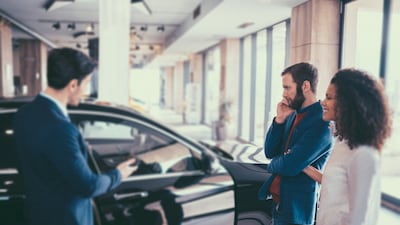Buying a new car can be exciting and nerve-racking at the same time. There are so many to choose from, so much information to take in and so much at stake if you make the wrong decision. And it's not just second-hand cars that we need to be careful about buying, as there are a number of scams that exist to get you to spend more on a new one, too. Many salespeople will take advantage of your lack of knowledge to increase their income and empty your pockets. Using tricks and scams to increase the dealership's bottom line at the expense of the customer isn't rare. But follow our guide and you'll be able to avoid the most common, costly and devious scams around.
Little lies
The scam: Many car salespeople use little lies to steer buyers into purchasing quickly and often with extras you don't need. Be aware of people saying things like: "This is the last car available with this specification ... There are no other dealers in the GCC able to give you this deal ... This is a limited price offer and it's the last day today ... The colour you want has been discontinued ... Someone else is coming to see the car today, if you don't want to miss out, you'll need to sign now."
The solution: Buying a car is one of the biggest and most expensive purchases in your life, so don't rush. Car sales are down lately, so hold out and wait for the vehicle you really want, with the specifications you need. Listen to the salesperson, but do your own research and shop around.
We buy anything
The scam: There are loads of online markets that offer the 'we buy any car' promise and that's great. However, just remember how they work. You call up and describe your car, then they make you an attractive offer and ask you to bring it in for inspection. You arrive and they highlight reasons the car isn't worth as much as they quoted over the phone and offer less. As most sellers go to these companies hoping for a quick sale, the offer will never be as good as selling privately. The company doesn't keep your car; it goes on a list that is sent to all the dealers in your region and they then get a good car at a good price and the site takes a profit without having to fork out for repair or storage.
The solution: Sell privately where possible. A nice car with a good write-up and full service history will sell eventually. Don't state if you are leaving the country, as then buyers assume you are running out of time and therefore will offer far less money than the car is worth, thinking you don't have any other options. Sell early and use a hire car in the interim if needs be.
Bait and switch
The scam: We've all seen the glass-fronted, marble-floored showroom stuffed full of high-end red, gold and white supercars. They've become synonymous with the UAE car market. You are browsing the internet and spot an amazing deal advertising your dream car and it's within your budget. You call up and get excited when they say "come in for a test drive". You arrive, but the car just sold. Your heart sinks, but you're in luck, there's another car just like it out back. The only glitch is that it's more expensive. It's called 'bait and switch' and it's a scam to get you in the showroom.
The solution: Before heading to the showroom, call the dealer and say you'll be there in 10 minutes. Ask if the car is still available and tell them you have the exact budget and only for the advertised car at the advertised price. If the car is there, they will be keen to see you. If it's not real, they'll tell you it's sold already.
Paint protection and toughened glass
The scam: You have decided what car you're going to buy and are about to sign the paperwork when the salesperson remembers something that will really help you: paint protection! It's not just paint protection, it's also seat protection treatment (usually fabric spray), windscreen protection (a thin film or Rainex) or the dealer's very special cleaning kit that's not available to buy anywhere else. That is otherwise known as high-street car cleaner in the manufacturer's branded bottle.
The solution: Just say 'no'. Every modern car has a sort of paint protection as standard. Manufacturers test cars in hot and cold-weather countries to make sure the mechanical parts run smoothly, but also to make sure the paint, plastics and composites all stand up to the local terrain. Plus, anything classed as wear and tear is covered by the warranty, anyway. There are companies that offer a ceramic paint coat, which helps, however you need to remember that something like this not only adds weight to the car, it also alters the exterior and is more expensive to repair if you have an accident.
Too good to be true
The scam: There is an advert for a car online and it's perfect. It has full service history, low mileage, every extra available and it's cheap, because the person is only selling as he's been promoted and being transferred to another country. On inspection, the car looks great. The owner is travelling, so his 'friend' shows you the car. You jump at the chance to buy it and hand over a deposit. As the owner is now overseas, he asks you to transfer the cash into an overseas bank account. His 'friend' will meet you to register the car as soon as the money has cleared. You wait a few days, call and email, but never see or hear from your overseas 'friend' ever again. It's likely that the car was owned by someone else and your money is gone.
The solution: If it seems too good to be true, it probably is. Don't transfer money overseas. Hand over the cash at Tasjeel, as the car is being transferred into your name.


